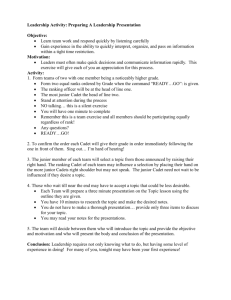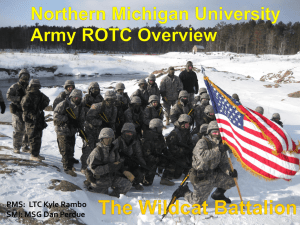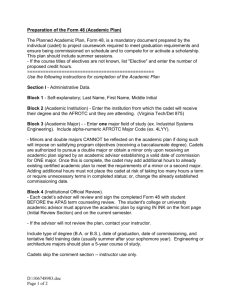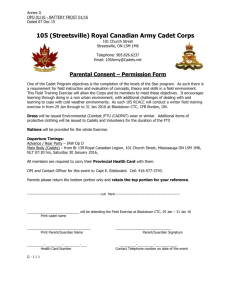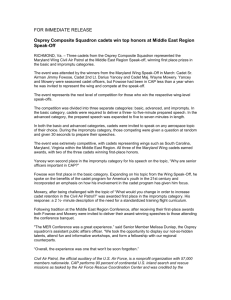Air Force ROTC Constitution - Student Organizations
advertisement
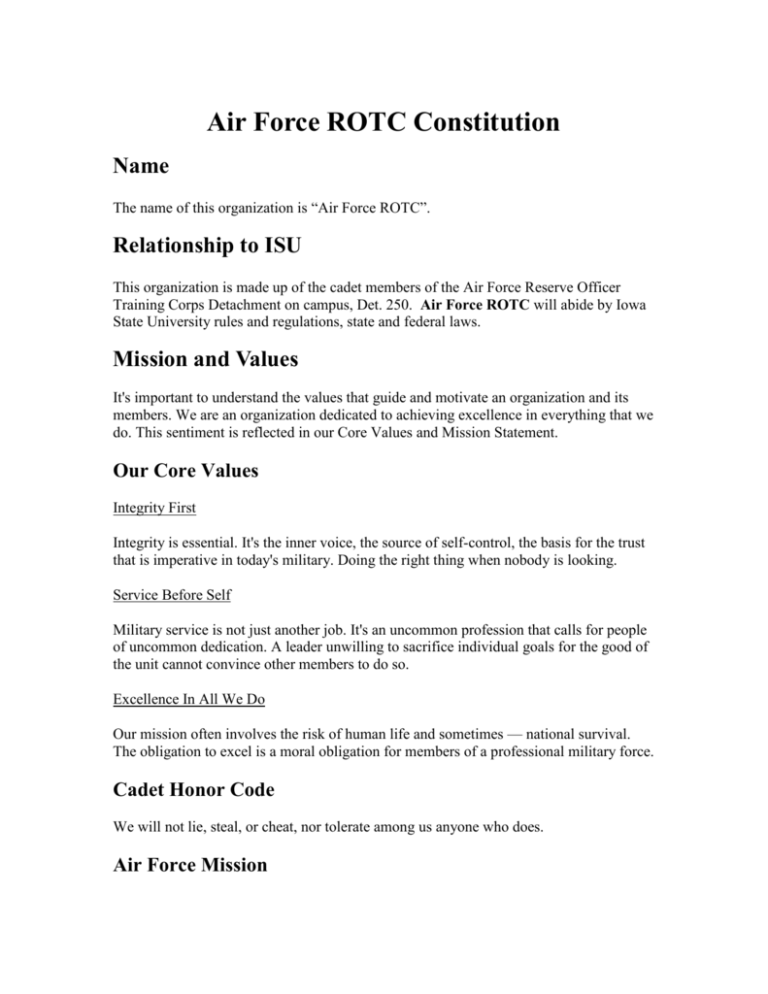
Air Force ROTC Constitution Name The name of this organization is “Air Force ROTC”. Relationship to ISU This organization is made up of the cadet members of the Air Force Reserve Officer Training Corps Detachment on campus, Det. 250. Air Force ROTC will abide by Iowa State University rules and regulations, state and federal laws. Mission and Values It's important to understand the values that guide and motivate an organization and its members. We are an organization dedicated to achieving excellence in everything that we do. This sentiment is reflected in our Core Values and Mission Statement. Our Core Values Integrity First Integrity is essential. It's the inner voice, the source of self-control, the basis for the trust that is imperative in today's military. Doing the right thing when nobody is looking. Service Before Self Military service is not just another job. It's an uncommon profession that calls for people of uncommon dedication. A leader unwilling to sacrifice individual goals for the good of the unit cannot convince other members to do so. Excellence In All We Do Our mission often involves the risk of human life and sometimes — national survival. The obligation to excel is a moral obligation for members of a professional military force. Cadet Honor Code We will not lie, steal, or cheat, nor tolerate among us anyone who does. Air Force Mission To defend the United States and protect its interests through aerospace power. We are America's Airmen. We are warriors…we will fight and win wherever our nation needs us. The aerospace realm is our domain, and we are vigilant in our commitment to defend, control and use it in our nation's interest. We are leaders…we live our core values. We are a Total Force – Active, Guard, Reserve and Civilian – seamless in providing aerospace power. We do not operate alone. Our efforts are made possible by the great support of many. Our families, our retirees, the employers of our Guardsmen and Reservists, our industry partners and the communities in which we live and work enable us to carry out our mission. And we are partners in the Joint Team... we project aerospace power anywhere in the world, and operate in concert with America's land and sea forces, and with our allies. Wherever we serve, whatever we do, we are America's Airmen. We will recruit, train and retain America's best young men and women to provide Global Vigilance, Reach and Power to our nation in the 21st Century. We will command and lead effectively at all levels – with decisiveness and concern for our people. We'll provide an environment that encourages all our people to achieve personal and professional excellence, taking pride in being part of the aerospace force that's respected all over world. We will size, shape and operate the force to meet the needs of the nation. We must also manage the effects of tempo on our people. This is particularly important for those elements of the force currently in short supply, but in high demand. And we'll continue leading the way in leveraging the strengths of all our components to optimize Total Force effectiveness in peace as well as war. America's Airmen will be smart, sharp and tough. We'll provide them with the education, equipment and training to perform at their best. And we will demonstrate commitment to our people and to their families, providing quality of life that lives up to their trust. Our Air Force will be worthy of the great men and women who join us. Air Force ROTC Mission Develop Quality Leaders for the Air Force. Air Force ROTC offers two educational programs – the Air Force Senior ROTC Program and the Air Force Junior ROTC Program. Air Force ROTC's headquarters is at Maxwell AFB, Montgomery, Ala. The Air Force Senior ROTC Program is designed to recruit, educate and commission officer candidates through college campus programs based on Air Force requirements. Units are located at 144 college and university campuses throughout the United States and Puerto Rico. Students from schools near Air Force ROTC host institutions can attend classes through 1025 separate cross-town enrollment programs or consortium agreements. The Air Force Junior ROTC Program provides citizenship training and an aerospace science program at the high school level. Units are located at over 750 high schools across the United States and at selected Department of Defense dependent schools in Europe, the Pacific, and Puerto Rico. More units are projected to open in each of the next three years. Advisors Cadet advisors will be Air Force personnel ranging from commissioned to noncommissioned officers. The advisors will mentor and monitor the progress of each cadet throughout his college career and advise them along the way. The advisors will determine if a cadet meets requirements and their active role within the organization. Due to the military nature of this organization, advisors are appointed by Headquarters, Air Force ROTC. The dates of their appointment are completely dependent on Headquarters, Air Force ROTC. Membership Membership shall be open to all registered students at Iowa State University and Drake University. Members will be put into one of two groups, POC or GMC. A member’s group will depend upon completion of field training and the detachment’s cadre. General Requirements General Military Course Requirements The General Military Course (GMC General Military Course - a ROTC course offered to freshmen and sophomores designed to improve communication skills and provide instruction about the Profession of Arms.) is offered to freshmen and sophomore students who meet the following minimum membership requirements: Enrolled in an accredited college that hosts or has a cross-town agreement with an Air Force ROTC Detachment United States citizen (if on scholarship) In good physical condition Of good moral character Age 14 years or older – 17 years old to receive a scholarship Attend both the Aerospace Studies class and Leadership Lab each semester The following credentials may preclude you from Air Force ROTC membership, but will not keep you from enrolling in an Aerospace Studies class: Conscientious objectors – one who has or had a firm, fixed and sincere objection to participation in war, in any form, or to the bearing of arms because of religious training or belief, which includes solely moral or ethical beliefs Present or former commissioned officers of the Armed Forces Officers of the Health Services and Mental Health Administration and members of the National Oceanic and Atmospheric Administration Those medically diagnosed with asthma or who have been prescribed Ritalin or any other medication for ADD and/or ADHD at any point in their life may be precluded from military service, but they may be waived depending on diagnosis and treatment Individuals on active duty with any military service – enlisted/warrant officers of Reserve or National Guard unless conditionally released Nonimmigrant students from nations not approved by the Department of State Students who do not or cannot meet required standards of weight, appearance, decorum, discipline and military performance Individuals who have dropped out of a previous officer training program (e.g., Officer Training School, United States Air Force Academy, etc.) but this may be waived depending on individual circumstances. Professional Officer Course Requirements The Professional Officer Course (POC Professional Officer Course - ROTC course for juniors and seniors.) is offered to juniors and seniors who have already committed to a four-year post-graduation service commitment with the Air Force. You must meet all the GMC membership requirements and: Be a United States citizen Be of legal age as required by the state in which you will be attending ROTC – or 17 years old with a parent or guardian's consent Be in good academic standing 4- and 2-Year Program: have two academic years remaining in a degree program (undergraduate, graduate, or combination of both) Participate in both Aerospace Studies classes and Leadership Laboratory (LLAB ROTC course for all cadets to learn management and leadership skills) each semester Meet the age requirements: o Rated (pilot or navigator) – commissioned before reaching the age of 29 o Scholarship applicants – be less than 31 years old as of December 31 of the year you will commission o Tech, non-tech and non-rated – commissioned by age 30 (waiverable up to age 35) Be physically qualified: o Meet Air Force Height and Weight Standards o Pass the Air Force Physical Fitness Assesment (PFA - an exam composed of three events in the following order: push-ups, crunches, and a 1.5-mile run). The test is used to ensure cadets maintain an acceptable level of fitness. (PFA) Have a military certified/qualified physical Pass the Air Force Officer Qualifying Test (A standardized test similar to the SAT and ACT that measures aptitudes, and is used to select applicants for officer commissioning programs or specific training programs. A required test for all cadets and students on scholarship or in the POC). (AFOQT) Be selected by a board of Air Force officers Complete a Field-Training (4- or 6-week program involving physical conditioning, weapons training, and survival training, as well as an opportunity to develop skills as both a leader and team member). o 4-Year Program: 4-week Field-Training Unit o 2-Year Program: 4-week Field-Training Unit with AS100Aerospace Studies. Freshman-level course focusing on the structure and missions of Air Force organizations, officership and professionalism. and AS200Aerospace Studies. Sophomore-level course concerned with the beginnings of manned flight and the development of aerospace power in the United States. These classes are provided in a 2-week period immediately preceding Field Training If you are single with a dependent or married to a military member with dependent, a dependent care plan must be completed. A dependent is defined as anyone incapable of self-care: e.g., child, parent, etc. Organization Officers Requirements Have a minimum cumulative grade point average (GPA) as stated below and meet the minimum GPA in the semester immediately prior to the election/appointment, the semester of election/appointment and semesters during the term of office. For undergraduate, graduate, and professional students, the minimum cumulative GPA is 2.00. In order for this provision to be met, at least six hours (half-time credits) must have been taken for the semester under consideration. i. ii. Be in good standing with the university and enrolled: at least half time (six or more credit hours) if an undergraduate student (unless fewer credits are required to graduate in the spring and fall semesters) during the term of office, and at least half time (four or more credits) if a graduate level student (unless fewer credits are required in the final stages of their degree as defined by the Continuous Registration Requirement) during their term of office. Be ineligible to hold an office should the student fail to maintain the requirements as prescribed in (i) and (ii)." Procedures Due to the military nature of the organization, none of the officers are elected. They are selected by the Wing Commander (described below) with the permission of the organization advisors. As such, there are no dates of election. However, officers generally change at each semester, barring any sort of insurrection or coup. Outside of aforementioned insurrection or coup, officers can only be removed with the consent of the organization advisors. The replacement would follow the procedures for normal selection described above. List of Officers Wing Commander – The senior cadet in the wing, who oversees all activities and operations of the cadet wing. Treasurer – Is responsible for all fund transactions. Makes sure they occur IAW (in accordance with) the rules laid out in this document. Inspector General – Ensures organization members are meeting and maintaining the standards set forth by the policy packet and AFROTC regulations. Club Funds "All monies belonging to this organization shall be deposited and disbursed through a bank account established for this organization at the Campus Organizations Accounting Office and/or approved institution/office (must receive authorization via Campus Organizations Accounting Office and Student Activities Center). All funds must be deposited within 24 hours after collection. The Adviser to this organization must approve and sign each expenditure before payment." (See Fiscal Responsibilities above.) Dues for this organization are the monies gathered through required fundraising events. An example of this required fundraising would be the two football games that all members are required to help DPS park for. Affiliation Air Force ROTC is affiliated with the United States Air Force. Individuals who complete the program are commissioned into the Air Force as Second Lieutenants and serve in a wide variety of jobs and locations. The program is administered using the rules and regulations of the Air Force, the Department of Defense and United States Code. All Air Force ROTC instructions governing the administration of the program may be found at https://pubs.maxwell.af.mil/ Amendment As stated below in this document, this document may be amended at any time in any way for any reason. Organization members will be informed of any changes made. This constitution may be amended and subsequently ratified at any time, with the unanimous approval of the President, Vice President, and Treasurer and with a simple majority of the membership, not counting abstainers. Members will be given one week to consider amendments. Ratified amendments to this Constitution must be submitted to the Student Activities Center within (10) days. Cadet Policy Packet MEMORANDUM FOR 250TH CADET WING FROM: CADET WG/CC SUBJECT: Spring 2009 Policy Packet 1. Leadership Lab Attendance Policy: 1.1 Operations Orders for the following weeks LLABs will be posted by the preceding Thursday in the Wing Room. The operations orders will contain uniform wear, place, time, inclement weather and lesson objectives. To be adequately prepared for lead lab it is each cadet’s responsibility to know all the information posted. 1.2 At the beginning of each LLAB, the MSS/PS will distribute attendance rosters for each flight. On this sheet you will find the name of each cadet in your flight and LLAB dates. Fill in the boxes according to the key printed on each sheet and return them to MSS/PS no later than 15 minutes after the start of each LLAB. 1.3 If a cadet is considered absent for any LLAB or mandatory event, they will be required to complete the missed lesson objectives at a makeup lab. Under extenuating circumstances the cadet may be eligible for an excused absence. To obtain an excused absence, the cadet must submit an absence excuse form which can only be approved by the COC. Absence excuse forms must be submitted directly to the COC’s mailbox within 24 hours of the missed event (excluding weekends). 1.4 Within 24 hours of LLAB, the Flt/CCs, SQ/CCs, OG/CC, and COC will receive a notification from the MSS/PS containing the names of those who must make up the LLAB. Make-ups will be posted on the Ops Order of the original LLAB. Only the make-up LLAB posted on the original Ops Order will qualify for credit towards the missed LLAB. Cadets must successfully complete 80% of all training to pass leadership laboratory. 1.5 Cadets who are more than 15 minutes late to a regular weekday morning lab will be counted as absent for the lab. They will be required to makeup the missed lesson objectives in accordance with the policy in section 1.3. As usual, cadets who fail to meet this suspense will receive an automatic unexcused, regardless of the reason. 1.6 Cadets who are recorded as late (not absent) can be late once. The second and every subsequent late appearance will count as absences. 2. Physical Training (PT) Attendance Policy: 2.1 Each cadet is required to attend PT sessions with the corps to ensure physical fitness standards. 2.2 There will be a sign in sheet at the beginning of the PT session. It is each cadet’s responsibility to sign his/her own name. If a cadet fails to sign it prior to the start of PT, they are counted absent for that PT session. 2.3 Cadets must attend at least two workout sessions per week for at least 80% of the weeks to receive a passing grade for LLAB. For example, if a cadet attends 2 or 3 workouts in a given week, he or she "passes" that week. Conversely, if a cadet attends 1 or no workout sessions in a week, he or she "fails" that week. Each cadet must "pass" a minimum of 80% of the weeks during which PT is held. 3. Honor Flight & Cadet of the Month 3.1 Each semester, one flight will be awarded Honor Flight; the specific criterion for winning Honor Flight of the month will be determined by the OG/CC and posted prior to the beginning of each term. 3.2 Cadet of the Month will be awarded to outstanding cadets for work done in a previous month, and at the end of the term for outstanding work done over the course of a given term. 3.2.1 The procedures for selection of the cadet of the month will be outlined by the WG/CV and made known to members of the Cadet Review and Awards Board. 3.3.2 The Cadet Review and Awards Board will be a panel of members from Wing Staff who are responsible for interviewing candidates nominated by POC for Cadet of the Month or Cadet of the Term as well as any other cadet corps awards available. 4. Uniform Wear: 4.1 To ensure standardized uniform wear at LLAB, weekly Operation Orders specify the appropriate uniform for each LLAB. Cadets must realize that the proper uniform for LLAB may differ each week. 4.2 Any cadet who attends LLAB in uniform other than that which is posted in the Ops Order will receive a missed suspense. This includes wearing incomplete uniforms. 4.3 Cadets must be in uniform from 0800 to 1700 on LLAB days while on campus. The uniform of the day is specified in the Ops Orders. Requests for exemption must be passed up the chain of command in an In-Turn memo and submitted to the COC for approval. 4.3.1 Requests shall be submitted five business days prior to the uniform wear day. All requests will be handled by the COC on a case-bycase basis. 4.4 All AS 250 cadets are required to wear AS 100 rank during the fall semester and AS 200 in the spring semester. 5. Cadet Evaluation Form Policy: 5.1 All cadets will receive an initial, midterm, and final evaluation from their direct supervisor each semester. The evaluations will be passed up the chain of command to the WG/IG. 5.2 Evaluation forms will be maintained in cadet personnel files by the IG. 5.3 All evaluation forms will be saved until the cadet is finished with the ROTC program. The forms will be on active file during the first year and on inactive file during the following years. 6. File/Binder Policy: 6.1 Active files are kept in position binders. The binders will hold information for the current semester and the two preceding semesters. Any older documents that must be kept will be placed in the inactive files located in the Wing Staff Office. 6.2 All documents should be filed chronologically with the most recent document first. Documents received without dates shall be assigned the date on which they are filed. 6.3 All binders must remain in the Wing Room or cadet areas unless there is a valid reason. The WG/IG will inspect binders at midterms and finals to ensure that the binders are being maintained correctly. 6.4 All cadets holding a position with a position binder must also maintain the appropriate folder on the cadet drive corresponding to their position. In this folder there must be an electronic copy of all generated documents contained in paper form in the position binder. Outside documents are not required to be scanned in, but anything for which a digital copy is readily available must be contained in the folder. It is also imperative to ensure that these folders are well organized. Binder inspections will also include these folders. 7. Corps-Related Activities Policy: 7.1 All activities other than Leadership Laboratory and PT are voluntary. However, if a cadet volunteers to attend or participate in an activity, the cadet is expected to be present. 7.2 The tenets of the Honor Code apply, and an unexcused withdrawal or absence from the activity will result in disciplinary action. 8. Posting of Announcements and E-mail List Policy: 8.1 The WG/IG must approve all announcements before they may be posted either in the Wing Room or outside the Wing Room. They must be typed and look professional. 8.2 NO items will be posted anywhere other than on a bulletin board without permission from the WG/IG. All announcements must be placed in the WG/IG mailbox for approval (with a note of explanation, if needed). The proposed announcements will then be passed to the COC for final approval. 8.3 All announcements to be given by a cadet at LLAB must be approved by the WG/IG before the start of LLAB. 8.4 All e-mail designated for Corps mass lists must be approved by the MSS/IT. A copy of the approved e-mail will then be sent. All requests must be for official corps business or related activities. 9. Multiple Copies for Binder Use Policy: 9.1 Any official memorandum (i.e., semester report, after actions, suspense report, etc.) should have at least two (2) copies. The original shall be an In-Turn memo sent up the chain to the WG/CC and COC, and the duplicate copy is to be filed directly in the binder. This is to ensure that there will always be current information in the binder. 9.2 When the approved original comes back down the chain of command, it shall replace the duplicate copy in the binder. 9.3 All binders must have a USB storage device that contains a copy of all documents throughout the semester. 10. Wing Room, Study Room, and Computer Room Cleanup Policy: 10.1 The appearance of the cadet area is a direct reflection on the Air Force and Detachment 250. For this reason, it is everyone's responsibility to keep these areas neat and clean AT ALL TIMES. Cadet areas include the Wing Room, Computer Room, Study Room, classroom (Room 141) and all hallways. 10.2 Each respective flight commander is directly responsible for monitoring the appearance of the cadet areas during their assigned weeks. Inspections will be conducted two times per week. Each of the inspections will be given a numerical score. Scoring can be found on the inspection checklist located on the WG/IG board. The lower score will be the number of honor flight points awarded. Failure to execute cleaning duties will result in counseling by the WG/IG. 10.3 All cleaning supplies can be found in the cabinets in the back hallway. Please notify the MSS/RS when supplies run low. 10.4 The refrigerator's sole purpose is for the pop project. Temporary storage is permitted if room is available. Food in the way of the pop project will be thrown away. 10.5 The duties for cleaning the cadet areas can be found on the WG/IG board. 10.6 Weekly responsibilities can be found on the Announcement bulletin board in the Wing Room. The appropriate box must be initialed each day NLT the time specified by the WG/IG. 11. Library Checkout Policy: 11.1 The books shelved in the Wing Staff Office are in alphabetical order by title and numbered by subject. 11.2 To check out a book write last name, first name, and the date the book was checked out on the card. Then place the card in the cardboard box. 11.3 Library books are due for return three weeks from the checkout date and must be placed on the returned bookshelf. 12. Corps Computer Usage and Documentation Saving Policy: 12.1 No computer software should be added or manipulated on any of the corps computers except by the MSS/IT. 12.2 In an effort to minimize hard drive space usage, an “I” drive was created on the AFROTC network. The “I” drive can be accessed from any computer on the AFROTC network. The drive also has a personal files folder which contains folders for each AS class. Cadets can create personal folders to hold files in these folders. 12.3 With approval from the WG/CC, the MSS/IT may delete all personal files. Cadets will be notified in advance, in order for them to save any important documents onto a personal disk. 13. Inclement Weather Policy: 13.1 This policy describes notification in case of inclement weather affecting a required AFROTC activity. 13.2 In case of inclement weather, an email notification will be sent to the corps NLT 40 minutes prior to the scheduled start time. 13.3 In addition to an e-mail notification, all cadets will receive a phone call from a pre-designated phone contact list NLT 30 minutes prior to the scheduled start time. 13.4 If you have any questions about the cancellation of an activity due to inclement weather, contact your supervisor. 13.5 Watch caps are authorized for wear to lab when temperatures are at or below 32°F. If watch caps are worn to Lead Lab, cadets must also bring Flight or BDU covers to be worn during lab. 14. Mailbox Policy: 14.1 Cadet mailboxes are important tools in making sure the Cadet Wing is well informed. Cadets will check mailboxes in a regular and timely manner. Long-term storage of personal items is not permitted. 14.2 Cadets may only remove or read mail from their mailbox. However, it is acceptable for a cadet to request another to check their mailbox if they are unable to do it themselves. 14.3 Waivers from cross-campus cadets (i.e. Drake and Grandview cadets) are accepted until the end of the second week of classes. Cadets with waivers will be required to check their boxes on days that they attend AFAS class. Additionally, wavered GMC will check their E-Mail on Tuesdays and Fridays prior to 1700. Wavered POC will check their E-Mail prior to 1700 Monday through Friday. 15. Missed Suspense Policy: 15.1 To ensure that cadets are held accountable for their responsibilities, the following policy will be adhered to. If a cadet fails to meet his/her responsibilities (i.e. missed suspense, missed appointment, missed CV cards, etc.) the following system of consequences will be implemented for the Wing as a whole. 15.1.1 All suspense dates made by a supervisor, whether wing level, group level, squadron level, or flight level, must be universally known. 15.2 For each suspense missed, the direct supervisor or other POC will fill out an incident report via the web at: http://spreadsheets.google.com/viewform?key=plB0oLB8uoNtVEO6TCGwUQg &hl=en The WG/CV will email the direct supervisor with a copy of the incident report. The following subsections provide a guideline for the type of counseling that should be used. 15.2.1 If the violation is a minor infraction, the supervisor should complete a verbal counseling. This can be an informal counseling outlining the offense and why it is important to maintain accountability. Minor infractions will include but are not limited to the following: Missed CV card, late to or missing a flight meeting, Wing Room cleanup, flag duty, or other non-PMT activities without prior notice, and minor issues with uniform appearance for GMC cadets. Those offenses not listed is up to the discretion of the supervisor. 15.2.2 If the violation is a major offense or a repeat minor offense, the supervisor should complete a Letter of Counseling (LOC). A Sample LOC is provided on the cadet folder and will also be emailed to the supervisor after receiving the initial incident report. A formal counseling with the supervisor should be held. Once completed, a copy of the LOC needs to be turned into the WG/CV mailbox. Major infractions will include but are not limited to the following: failure to sign off on the policy packet or other items given at least a weeks notice, missing PT, late to or missing Lead Lab or other required PMT without notice, and uniform issues for POC. Those offenses not listed are up to the discretion of the supervisor. 15.2.3 If the violation is a repeated major offense or several repeated minor offenses, the supervisor should complete a Letter of Reprimand (LOR). A sample LOR will be provided on the cadet folder and will also be emailed to the supervisor after receiving the initial incident report. A formal counseling with the supervisor, subordinate, and the COC will be held. Once completed the LOR will be turned into the WG/CV mailbox and then given to the COC. 15.2.3 The WG/CV has the authority to approve or disapprove the severity of any reported incident (major or minor). Therefore, the supervisor should refrain from formally counseling the cadet until receiving confirmation from the WG/CV. This will ensure that all parties involved clearly understand the severity of the report being made, since this information will be available to the cadre. However, informal on the job (OTJ) counseling should be administered immediately when appropriate. 15.3 All offenses will be kept in a database called the Semester Event Register (SER). The WG/CV will update this daily and give a weekly report to the COC. The WG/CV and the members of the Cadre will be allowed to view the SER. Supervisors may also obtain a copy of their subordinate’s record from the WG/CV. 15.4 It is the supervisor's responsibility to ensure cadet counselings are uniformly known, consistently applied, and non-selectively enforced. It is also imperative that POC report infractions to maintain accountability and ensure that the above requirements remain consistent throughout the corps. 16. Acknowledging Cadets and Cadet of the Month Nominations 16.1 Acknowledgement of cadets’ performance may also be reported via the web at http://spreadsheets.google.com/viewform?key=plB0oLB8uoNtVEO6TCGwUQg &hl=en. POC are not only obligated to report infractions but also above standard performance. Outstanding performance will also be kept in the SER. 16.2 Cadet of the Month Nominations will be turned in the end of each month via the same web based form. When nominating a cadet and not just acknowledging performance, write this in the description box of the form along with a paragraph of why you are nominating the cadet. 17. Personal Property in the Wing Room Policy: 17.1 The Wing Room, computer lab, and hallway are not places to keep your personal property for an extended period of time. 17.2 If personal property is left in the Cadet Area for more than 24 hours it may be moved to the Wing Room Lost and Found box. 17.3 Large items placed in mailboxes for an extended period of time may be removed if they interfere with the flow of Corps communications. 18. Paper Policy for Printer and Copier Use: 18.1 Cadets will be limited to 10 sheets of new paper for personal assignments per day. There shall be no limit for ROTC assignments or reuse of paper. Mass quantities can be produced faster and cheaper at the Hub or Copy Works. This policy applies to both printer and copier paper. Please use the blank side of used paper whenever possible. 18.2 Only one ream of paper will be made available to the cadet computer lab each week. Use this paper wisely and be mindful of others who need paper too. 19. POC Meeting and Wing Staff Meeting Attendance Policy: 19.1 POC meetings will be held as necessary and are not considered PMT (AFROTCI 36-2017). 19.2 Attendance at POC meetings is voluntary (unlike POC LLABs, which are mandatory): however, POC must inform the WG/CV if they know they will be absent. If absent from the meeting, they must contact the WG/CV NLT 48 hours after the POC meeting to obtain a copy of the meeting notes and any other necessary information. 19.3 Attendance at Wing Staff Meetings is mandatory for all Wing Staff members. 20. Monetary Procedures Policy: 20.1 Within 14 days after the start of each semester, cadets needing funding for their particular position duties will submit a proposed budget. This budget will detail the amount of monetary assistance needed and the breakdown of where the proposed funds will be used. 20.1.1 Within 21 days after the start of each semester, Wingstaff members will decide on how all monetary funds will be distributed. These decisions will be made not only on the proposed budgets listed in paragraph 20.1 but also on the amount of funding available to the detachment in whole. 20.1.2 It is the responsibility of each cadet receiving funding to not go over their allotted amount. 20.2 If a cadet needs to purchase an item, he or she will complete a voucher request form located in the Student Organization Resources Officer’s mailbox which in turn will be passed up the chain to the COC. The cadet must specify on the voucher the item(s) to be purchased and the cost of that item(s). If the exact cost is not known, a reasonable estimation may be submitted. 20.3 After approval or denial, the voucher request form will be passed back down to the Student Organization Resources Officer. Only after approval can the expenditure be made. All vouchers must be signed by the Student Organization Resources Officer and the Organization Advisor, Captain Menschener. 20.4 If a vendor will not accept an approved voucher, note the denial on the voucher request form and submit a receipt to the Student Organization Resources Officer for reimbursement. 20.5 If you need to make a deposit to the corps’s account or have any questions concerning monetary procedures, contact the Student Organization Resources Officer. 21. Cadet Use of Armory Room 139: 21.1 Armory room 139 is located past the north end of the cadre offices and is available upon request from cadre personnel. 22. Wing Room Lock Policy: 22.1 The cipher locks installed on the computer room, Wing Room, and Wing Staff office doors will contain a code for access. Cadets will be responsible for the following: 22.1.1 Ensure that the given code remains secure. 22.1.2 If entering the cadet areas after COB, ensure all doors are closed and secured before leaving. 23. CV Cards 23.1 CV cards are a way to ensure all cadets are keeping up with corps-wide communications. 23.1 All cadets will be required to check their email daily, and read all corps email. From time to time, the WG/CV will send out “email CV cards” which will consist of a message embedded in a regular corps email that requires cadets to respond to the email message before 0800 the following day. Cadets who fail to respond to email CV cards 3 times or more will receive a missed suspense counseling as mentioned in paragraph 15 above. 24. Agreement 24.1 This document may be changed or amended at any time. Should this occur, cadets will be notified by their immediate supervisor and will be given a new suspense to sign off on the addendum. 24.2 Cadets must sign off that they have read and understand the terms presented in this publication.

